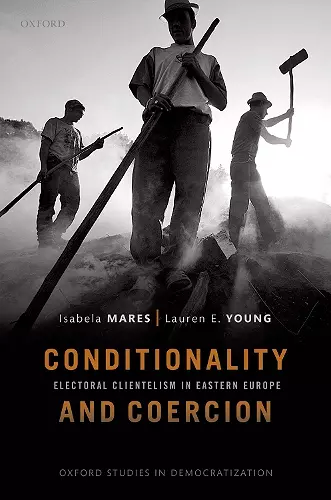Conditionality & Coercion
Electoral clientelism in Eastern Europe
Isabela Mares author Lauren E Young author
Format:Paperback
Publisher:Oxford University Press
Published:17th Oct '19
Currently unavailable, and unfortunately no date known when it will be back

In many recent democracies, candidates compete for office using illegal strategies to influence voters. In Hungary and Romania, local actors including mayors and bureaucrats offer access to social policy benefits to voters who offer to support their preferred candidates, and they threaten others with the loss of a range of policy and private benefits for voting the "wrong" way. These quid pro quo exchanges are often called clientelism. How can politicians and their accomplices get away with such illegal campaigning in otherwise democratic, competitive elections? When do they rely on the worst forms of clientelism that involve threatening voters and manipulating public benefits? Conditionality and Coercion: Electoral Clientelism in Eastern Europe uses a mixed method approach to understand how illegal forms of campaigning including vote buying and electoral coercion persist in two democratic countries in the European Union. It argues that we must disaggregate clientelistic strategies based on whether they use public or private resources, and whether they involve positive promises or negative threats and coercion. We document that the type of clientelistic strategies that candidates and brokers use varies systematically across localities based on their underlying social coalitions. We also show that voters assess and sanction different forms of clientelism in different ways. Voters glean information about politicians' personal characteristics and their policy preferences from the clientelistic strategies these candidates deploy. Most voters judge candidates who use clientelism harshly. So how does clientelism, including its most odious coercive forms, persist in democratic systems? This book suggests that politicians can get away with clientelism by using forms of it that are in line with the policy preferences of constituencies whose votes they need. Clientelistic and programmatic strategies are not as distinct as previous have argued. Oxford Studies in Democratization is a series for scholars and students of comparative politics and related disciplines. Volumes concentrate on the comparative study of the democratization process that accompanied the decline and termination of the cold war. The geographical focus of the series is primarily Latin America, the Caribbean, Southern and Eastern Europe, and relevant experiences in Africa and Asia. The series editor is Laurence Whitehead, Senior Research Fellow, Nuffield College, University of Oxford.
[The book] represents a huge contribution both theoretically and empirically. The latter is not only to be commended because of its methodological inventiveness, but also due to the demanding original data collection strategy focusing on actual individuals—putting the 'social' into social scientific research. * Máté Mátyás, Marie Skłodowska-Curie Research Fellow and PhD Candidate, Corvinus University, Budapest, Hungary, Europe-Asia Studies *
Mares and Young use both ethnographic and survey evidence to analyze everyday politics in poor rural regions of Hungary and Romania. Local politicians use their discretion in allocating state resources to buy votes; they also exploit political differences within the community by applying welfare programs in a coercive manner, thus attracting support from the working poor. This signaling blurs the distinction between clientilistic and programmatic appeals. Threats seem to be more effective than gifts, and employers or moneylenders are often used as intermediaries. Such tactics are used by parties on both the Right and the Left. A flawed electoral system combines with such factors as corruption and poverty to lead to widespread disillusionment with the efficacy of democracy. Exemplary in its use of both qualitative and quantitative methods, this book will be of interest to students and scholars of electoral politics around the world. * P. Rutland, Wesleyan University, CHOICE *
- Winner of Winner of the APSA William Riker Award for the best book in Political Economy Honourable Mention from the Gregory Luebbert Award.
ISBN: 9780198832782
Dimensions: 233mm x 155mm x 20mm
Weight: 535g
352 pages